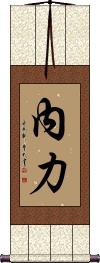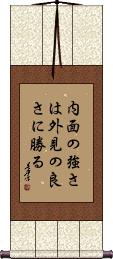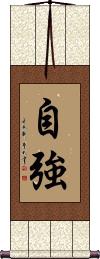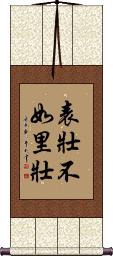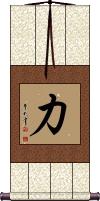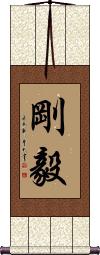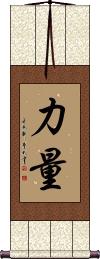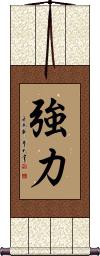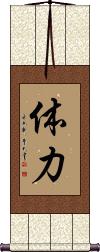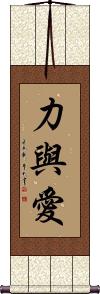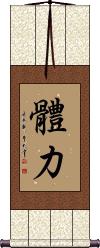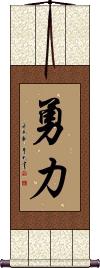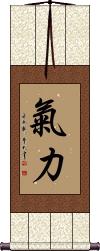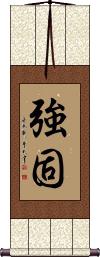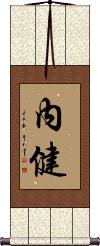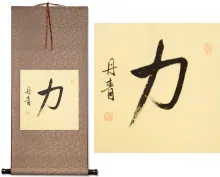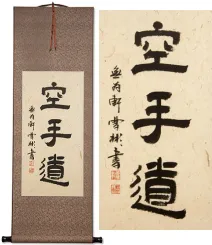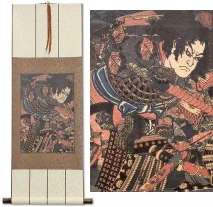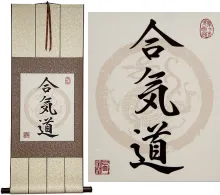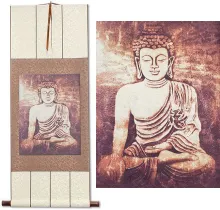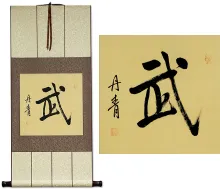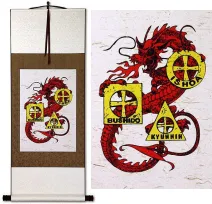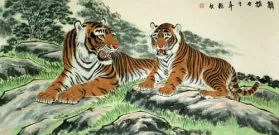Many custom options...
And formats...

Strength in Chinese / Japanese...
Buy a Strength calligraphy wall scroll here!
Personalize your custom “Strength” project by clicking the button next to your favorite “Strength” title below...
2. With all the strength of your heart
3. Inner Strength is Better than Outward Appearance
4. Inner Strength / Self-Improvement
5. Inner Strength is Better than Outward Appearance
6. Always Striving for Inner Strength
7. Spiritual Strength / Strength of Spirit
9. Fortitude / Strength of Character
13. Strength and Love in Unity
20. Conquering Yourself is a Sign of Strength
Inner Strength
內力 is the shorter version of inner strength (can also be translated as “internal force”). The first character holds the meaning of “inner” or “internal.” The second character means “power,” “force,” or “strength.”
內力 is a Kung Fu way of talking about an inner power or strength from within. This is a way to express “inner chi.” This is something that you might hear in a real Chinese Kung Fu movie.
While understood in Chinese and Japanese, this can have a secondary meaning of “inner stress” in Japanese.
Inner Strength
內在力量 is the slightly-verbose way to say inner strength.
The first two characters mean “intrinsic” or “inner.” The second two characters mean “power,” “force” or “strength” (especially physical strength). 內在力量 is more a short phrase rather than just a word in Chinese and Korean. This can sort of be understood in Japanese but it's not normal/proper Japanese.
With all the strength of your heart
思い切り can be translated as “with all one's strength,” “with all one's heart,” “to the limits of your heart,” or “to the end of your heart/emotions.”
The character breakdown:
思い (omoi) thought; mind; heart; feelings; emotion; sentiment; love; affection; desire; wish; hope; expectation; imagination; experience
切り (kiri) bounds; limits.
Note: Because this selection contains some special Japanese Hiragana characters, it should be written by a Japanese calligrapher.
Inner Strength is Better than Outward Appearance
内面の強さは外見の良さに勝る is a Japanese proverb that literally translates as “inner/internal strength/power [versus] outward-appearance [the] merit/virtue/good quality [does] excel/surpass/exceed/outweigh.”
More naturally in English, this would be “Inner Strength Outweighs Outward Appearance.”
Note: Because this selection contains some special Japanese Hiragana characters, it should be written by a Japanese calligrapher.
Inner Strength / Self-Improvement
自強 is the kind of inner strength that applies to a person who has will-power and can inspire themselves to do great things.
自強 can also be the creed of a person that always pursues self-improvement.
Other translations: self-strengthening, striving for improvement, self-improvement, striving to become stronger, and self-renewal.
Inner Strength is Better than Outward Appearance
表壯不如里壯 literally translates as: [Better to be] strong inside than [to be] strong outside.
The ancient original meaning was:
[An] able [husband] outside [working to support a family is] not as good as [an] able [wife] inside [working and saving to take care of the family].
The current meaning is:
Inner strength is more important than outward appearance.
Always Striving for Inner Strength
自強不息 is a proverb or idiom that suggests that the pursuit of self-improvement is eternal. It can also be a suggestion to strive unremittingly in life.
The first two characters mean inner strength with the idea of self-improvement. The last two characters mean “never rest” or “striving without giving up.”
Some will translate these four characters as “Exert and strive hard without any let-up.”
Spiritual Strength / Strength of Spirit
精神力量 is a title that speaks of one's soul or spirit and the capacity or strength that soul possesses.
The first two characters mean mind, heart, spirit, and/or soul.
The last two characters mean strength, capacity, or ability.
Note: Separately, these are two words in Japanese and can be pronounced, but this does not make a natural title in Japanese (best if your audience is Chinese).
Power / Strength
力 is the simplest form of “power” or “strength.”
In Japanese, it is pronounced “chikara” when used alone, and “ryoku” when used in a sentence (there are also a few other possible pronunciations of this Kanji in Japanese).
In some contexts, this can mean ability, force, physical strength, capability, and influence.
Fortitude / Strength of Character
剛毅 is a Japanese and Chinese word that means resolute and firm, fortitude, firmness of character, hardihood, manliness, or macho.
See Also: Perseverance | Strength | Tenacity
Strength / Ability
力量 is a general strength term.
It can refer to mental or physical strength (depending on context). 力量 can also be used to describe strength in terms of capability, capacity, ability, and even tact. Some may translate this as power or force.
Herculean Strength
Strength and Courage
Strength and Love in Unity
力愛不二 is a proverb that literally means:
“Strength [and] Love [are] Not Two [separate ideas/concepts/things].”
You'll find this proverb translated from Japanese to English as:
Love and strength are not separate.
Power and love are indivisible.
Strength and love in harmony.
Strength and love stand together.
Old Japanese grammar is quite different than English, and so this proverb says a lot within the brevity of just 4 characters. If you just read these characters directly as “Strength Love Not Two,” you'd probably miss the real meaning.
According to the Swedish Shorinji Kempo Federation, this is the second characteristic of Shorinji Kempo.
This post really explains the concept best in my opinion: Bushido by MS: Riki Ai Fu Ni, which states: "Riki Ai Funi" is the philosophy that power (Riki) and love (Ai) are indivisible. More concretely, a person, who is powerful but does not have love, cannot control and misuse his/her power; on the other hand, a person, who has loved ones but is not powerful enough, cannot protect himself/herself nor loved ones.
Physical Strength
体力 means “physical strength” or “physical power.”
The first character was first simplified in Japan. Later, that simplified version became the standard in mainland China. Just in case you want this version, it is offered here. I suggest it if your audience is Japanese. Most Chinese know the older traditional version, which looks like 體力.
体力 can also be defined: stamina; endurance; physical strength; resilience; resistance to disease; clout; stability.
Strength and Courage
Strength and Love
Physical Strength
Courage and Strength
Strength / Vigor / Energy
Physical Strength
氣力 can mean any of the words in the title above, and in some contexts, can also mean effort, will-power, or talent.
This refers mostly to physical strength (as opposed to mental or spiritual).
![]() In modern Japan, they use a simplified first character for this word. If you want to order this title with that special Japanese version, click on the character to the right instead of the button above.
In modern Japan, they use a simplified first character for this word. If you want to order this title with that special Japanese version, click on the character to the right instead of the button above.
Conquering Yourself is a Sign of Strength
Strength: Strong and Solid
強固 means firmness, stability, security, and strength in Japanese.
It's not used commonly in China, but it means “powerful,” “firm,” “solid,” “strong,” or “better than others” in Chinese. There is a slight variation in the top of the first character between Chinese and Japanese. Because this is more of a Japanese word, we are showing the Japanese form here.
強固 is also a Korean word, but Korean Hanja uses the Chinese form of the first character (one tiny stroke is a little different), so just let me know if your audience is Korean when you place your order, and we'll have it written in the Chinese/Korean version.
Inner Strength / Inner Well-Being and Health
This in-stock artwork might be what you are looking for, and ships right away...
Gallery Price: $65.00
Your Price: $39.77
Gallery Price: $60.00
Your Price: $36.88
Gallery Price: $31.00
Your Price: $16.88
Gallery Price: $222.00
Your Price: $122.88
Gallery Price: $200.00
Your Price: $122.88
Gallery Price: $108.00
Your Price: $59.88
Gallery Price: $106.00
Your Price: $58.88
Gallery Price: $90.00
Your Price: $49.88
Gallery Price: $72.00
Your Price: $39.88
Gallery Price: $40.00
Your Price: $16.88
Gallery Price: $240.00
Your Price: $148.88
Gallery Price: $240.00
Your Price: $148.88
These search terms might be related to Strength:
8. Right Concentration / Perfect Concentration
A House Might Be Worth 1 Million Dollars, but Good Neighbors Are Worth 10 Million
Air Force
Concentration
Control of Power
Determination to Achieve / Will-Power
Forte
Girl Power / Woman Power
Good Health / Healthy / Vigor
Great Power
Intensity
Juggernaut / Absolute Power
Life Force
Perseverance / Will-Power
Power / Strength
Power of Oneself / Self-Sufficient
Power of Understanding and Wisdom
Psychic Power
Self-Discipline / Will-Power
Stamina / Vigor
Strength / Vigor / Energy
Strong / Powerful / Force
The Force
The Spirit of the Dragon Horse and Power of a Tiger
Will-Power / Self-Control
The following table may be helpful for those studying Chinese or Japanese...
| Title | Characters | Romaji (Romanized Japanese) | Various forms of Romanized Chinese | |
| Inner Strength | 內力 内力 | nai ryoku / nairyoku | nèi lì / nei4 li4 / nei li / neili | |
| Inner Strength | 內在力量 内在力量 | nèi zài lì liàng nei4 zai4 li4 liang4 nei zai li liang neizaililiang | nei tsai li liang neitsaililiang |
|
| With all the strength of your heart | 思い切り | omoi kiri / omoikiri | ||
| Inner Strength is Better than Outward Appearance | 内面の強さは外見の良さに勝る | naimen no tsuyosa ha gaiken no yosa ni masaru | ||
| Inner Strength Self-Improvement | 自強 自强 | zì qiáng / zi4 qiang2 / zi qiang / ziqiang | tzu ch`iang / tzuchiang / tzu chiang | |
| Inner Strength is Better than Outward Appearance | 表壯不如里壯 表壮不如里壮 | biǎo zhuàng bù rú lǐ zhuàng biao3 zhuang4 bu4 ru2 li3 zhuang4 biao zhuang bu ru li zhuang biaozhuangburulizhuang | piao chuang pu ju li chuang piaochuangpujulichuang |
|
| Always Striving for Inner Strength | 自強不息 自强不息 | zì qiáng bú xī zi4 qiang2 bu2 xi1 zi qiang bu xi ziqiangbuxi | tzu ch`iang pu hsi tzuchiangpuhsi tzu chiang pu hsi |
|
| Spiritual Strength Strength of Spirit | 精神力量 | seishin rikiryou seishinrikiryou seishin rikiryo | jīng shén lì liàng jing1 shen2 li4 liang4 jing shen li liang jingshenliliang | ching shen li liang chingshenliliang |
| Power Strength | 力 | chikara / ryoku | lì / li4 / li | |
| Fortitude Strength of Character | 剛毅 刚毅 | gouki / goki | gāng yì / gang1 yi4 / gang yi / gangyi | kang i / kangi |
| Strength Ability | 力量 | riki ryou / rikiryou / riki ryo | lì liàng / li4 liang4 / li liang / liliang | |
| Herculean Strength | 強力 强力 | kyou ryoku / kyouryoku / kyo ryoku | qiáng lì / qiang2 li4 / qiang li / qiangli | ch`iang li / chiangli / chiang li |
| Strength and Courage | 力量和勇氣 力量和勇气 | lì liàng hé yǒng qì li4 liang4 he2 yong3 qi4 li liang he yong qi liliangheyongqi | li liang ho yung ch`i lilianghoyungchi li liang ho yung chi |
|
| Strength and Love in Unity | 力愛不二 力爱不二 | riki ai fu ni rikiaifuni | ||
| Physical Strength | 體力 体力 | tairyoku | tǐ lì / ti3 li4 / ti li / tili | t`i li / tili / ti li |
| Strength and Courage | 力と勇氣 力と勇気 | riki to yu ki rikitoyuki | ||
| Strength and Love | 力與愛 力与爱 | lì yǔ ài li4 yu3 ai4 li yu ai liyuai | li yü ai liyüai |
|
| Physical Strength | 體力 体力 | tai ryoku / tairyoku | tǐ lì / ti3 li4 / ti li / tili | t`i li / tili / ti li |
| Courage and Strength | 勇力 | yuu ri / yuuri / yu ri | yǒng lì / yong3 li4 / yong li / yongli | yung li / yungli |
| Strength Vigor Energy | 氣力 气力 / 気力 | kiryoku | qì lì / qi4 li4 / qi li / qili | ch`i li / chili / chi li |
| Conquering Yourself is a Sign of Strength | 自勝者強也 | zì shèng zhě qiáng yě zi4 sheng4 zhe3 qiang2 ye3 zi sheng zhe qiang ye zishengzheqiangye | tzu sheng che ch`iang yeh tzushengchechiangyeh tzu sheng che chiang yeh |
|
| Strength: Strong and Solid | 強固 强固 | kyouko / kyoko | qiáng gù / qiang2 gu4 / qiang gu / qianggu | ch`iang ku / chiangku / chiang ku |
| Inner Strength Inner Well-Being and Health | 內健 | nèi jiàn / nei4 jian4 / nei jian / neijian | nei chien / neichien | |
| In some entries above you will see that characters have different versions above and below a line. In these cases, the characters above the line are Traditional Chinese, while the ones below are Simplified Chinese. | ||||
Successful Chinese Character and Japanese Kanji calligraphy searches within the last few hours...
